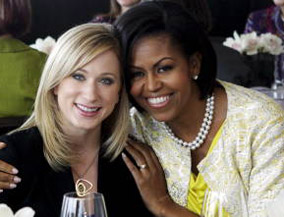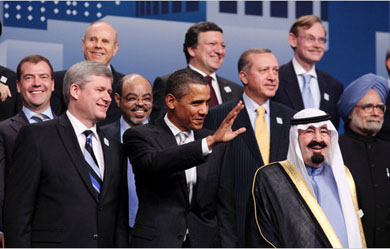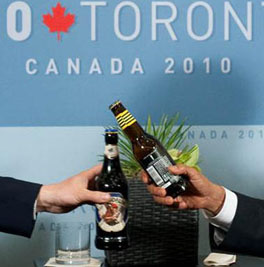G20 diary 2010 .. police finally go overboard .. new global village leaders take small step ahead, maybe?
Jun 28th, 2010 | By Citizen X | Category: In Brief
Michelle Obama and Canadian figure skater Joannie Rochette, at a "Women of Distinction" luncheon during the G20 Toronto Summit. Mike Cassese/REUTERS.
TORONTO. SUNDAY, JUNE 27, 2010. 11:15 PM ET. Customary Sunday dinner guests begged off this evening. They live just outside the G20 security zone downtown, and have to dig their car out of an alleyway. They did not want to confront the too many police on the streets near their house, who often seemed to be behaving somewhat irrationally.
Watching the TV coverage on cp24 (yet again) after dinner, you could see what they meant. A Canadian Press report summarizes what appears to be the essential dynamic in a single sentence: “After being criticized for letting things get out of control a day earlier, police cracked down on even peaceful protesters. By Sunday evening, the weekend arrest total topped 560.”
Today it wasn’t just “even peaceful protesters” the police were cracking down on either, apparently. Even unlucky passers-by could get caught in the net. See as well: “Outcry at police roundups spreads”; “Security costs, handling of protests raise questions” ; and (at perhaps the most hyperbolic end of the spectrum?) “Photos, eyewitness accounts and reports raise questions that only a full judicial inquiry can answer.”
Like many others, I continue to have some sympathy for the forces of law and order. At a press conference earlier this evening, “Staff Supt. Jeff McGuire said police had ‘significant evidence’ that individuals planning to carry out acts of Black Bloc violence similar to Saturday’s rampage along Yonge Street were ‘mixed in’ with protesters on Queen St. today … McGuire acknowledged that law-abiding citizens had been detained in the round-up at Queen St. W. and Spadina Ave., but insisted police executed a tactic they felt was necessary to prevent a repeat of Saturday … ‘A net gets thrown and people get caught… We’re not suggesting that we’re perfect … We’re facing very trying circumstances (and we’re) doing the best we can.’” Even so, the police have lost some of the moral high ground they held this morning.

“President Obama and other world leaders at the Group of 20 summit meeting in Toronto on Sunday” (including Prime Minister Harper). Luke Sharrett/The New York Times.
Meanwhile, now that it’s over, what finally happened at the alleged main event, to make it all worthwhile? If you have the stomach for such things you can read the “Final G20 Summit communique text” for yourself. My own considered guess is that, in the long sweep of future world history, the most significant part of this document may be its first sentence: “In Toronto, we held our first Summit of the G-20 in its new capacity as the premier forum for our international economic cooperation.”
There is much media buzz about the part of the final communique text that boldly declares: “advanced economies have committed to fiscal plans that will at least halve deficits by 2013 and stabilize or reduce government debt-to-GDP ratios by 2016.”
As the New York Times explains, however: “To assuage objections from the United States, Japan, India and some other countries, the timetable was couched as an expectation, rather than a firm deadline … It is the first time the G-20 has set dates for deficit reduction, but the timetable …Â Â is not binding … Most of the governments, including the United States, have already put forward budget proposals in line with the targets … Mr. Obama said … ‘Keep in mind that we had already proposed a long time ago that we were going to cut our deficits in half by 2013’.” (Which is also, conveniently, the year after the next US Presidential election.)

US President Barack Obama (r) and British Prime Minister David Cameron (l) clink bottles of beer as they settle a bet on the US-UK World Cup Soccer game, during meeting on sidelines of G20 Summit in Toronto. SAUL LOEB/AFP/Getty Images.
See also: “G20 vows to slash deficits, faces tough work” ; “G20 adopts Canadian compromise on deficits, bank tax” ; “At Summit, Banks Avoid New Global Regulations” ; “G20 members vow to safeguard economic recovery – in their own ways” ;Â and “A historic step toward a new world balance … G20 economic co-ordination has been tried before, but accountability will now rest at the highest levels.”
The main thing to remember, it still seems to me, is that the old “advanced” world economy of Europe (eventually including Russia), North America (north of the Rio Grande), and Japan has now officially given way to a rising new world economy that also includes such increasingly big players as China, India, Indonesia, Brazil, Mexico, Turkey, South Africa, South Korea, Argentina, Saudi Arabia, and Australia.
For political leaders from all these old and new most influential present-day economic actors to get together every so often, and talk about the problems they all face, more or less together, is progress in the global village of a sort, no doubt – even if workable great plans for extensive “international economic cooperation” are seldom produced.


